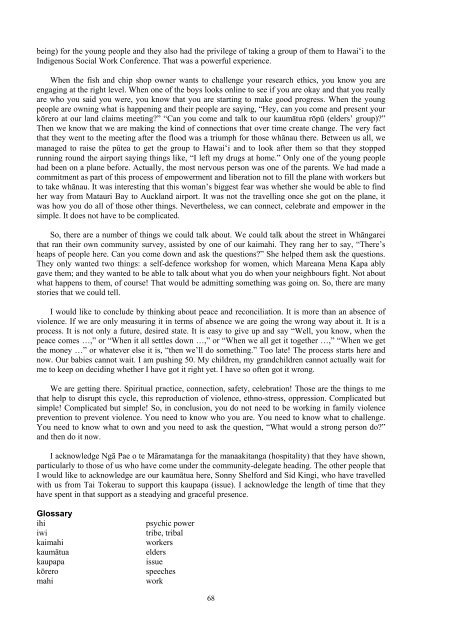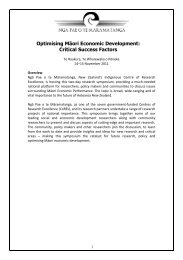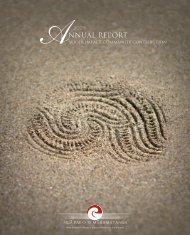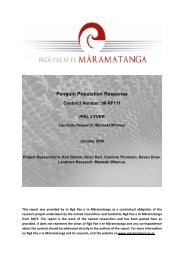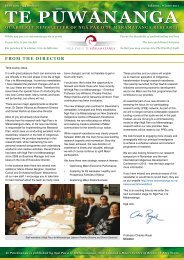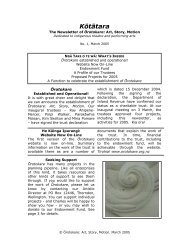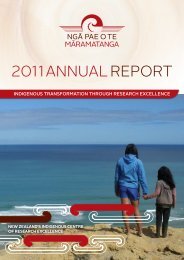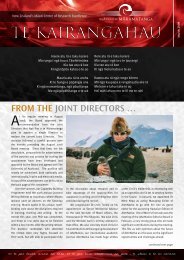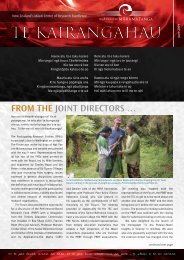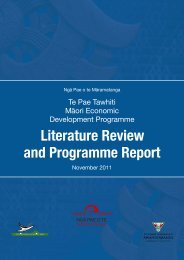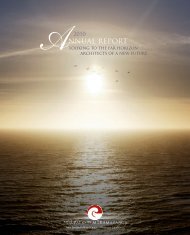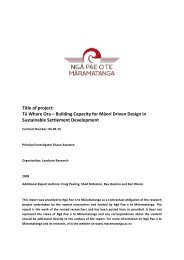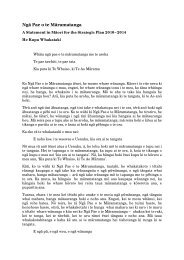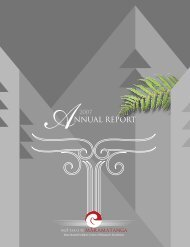traditional knowledge conference 2008 te tatau pounamu
traditional knowledge conference 2008 te tatau pounamu
traditional knowledge conference 2008 te tatau pounamu
Create successful ePaper yourself
Turn your PDF publications into a flip-book with our unique Google optimized e-Paper software.
eing) for the young people and they also had the privilege of taking a group of them to Hawai‘i to theIndigenous Social Work Conference. That was a powerful experience.When the fish and chip shop owner wants to challenge your research ethics, you know you areengaging at the right level. When one of the boys looks online to see if you are okay and that you reallyare who you said you were, you know that you are starting to make good progress. When the youngpeople are owning what is happening and their people are saying, “Hey, can you come and present yourkōrero at our land claims meeting?” “Can you come and talk to our kaumātua rōpū (elders’ group)?”Then we know that we are making the kind of connections that over time crea<strong>te</strong> change. The very factthat they went to the meeting af<strong>te</strong>r the flood was a triumph for those whānau there. Between us all, wemanaged to raise the pū<strong>te</strong>a to get the group to Hawai‘i and to look af<strong>te</strong>r them so that they stoppedrunning round the airport saying things like, “I left my drugs at home.” Only one of the young peoplehad been on a plane before. Actually, the most nervous person was one of the parents. We had made acommitment as part of this process of empowerment and liberation not to fill the plane with workers butto take whānau. It was in<strong>te</strong>resting that this woman’s biggest fear was whether she would be able to findher way from Matauri Bay to Auckland airport. It was not the travelling once she got on the plane, itwas how you do all of those other things. Nevertheless, we can connect, celebra<strong>te</strong> and empower in thesimple. It does not have to be complica<strong>te</strong>d.So, there are a number of things we could talk about. We could talk about the street in Whāngareithat ran their own community survey, assis<strong>te</strong>d by one of our kaimahi. They rang her to say, “There’sheaps of people here. Can you come down and ask the questions?” She helped them ask the questions.They only wan<strong>te</strong>d two things: a self-defence workshop for women, which Mareana Mena Kapa ablygave them; and they wan<strong>te</strong>d to be able to talk about what you do when your neighbours fight. Not aboutwhat happens to them, of course! That would be admitting something was going on. So, there are manystories that we could <strong>te</strong>ll.I would like to conclude by thinking about peace and reconciliation. It is more than an absence ofviolence. If we are only measuring it in <strong>te</strong>rms of absence we are going the wrong way about it. It is aprocess. It is not only a future, desired sta<strong>te</strong>. It is easy to give up and say “Well, you know, when thepeace comes …,” or “When it all settles down …,” or “When we all get it together …,” “When we getthe money …” or wha<strong>te</strong>ver else it is, “then we’ll do something.” Too la<strong>te</strong>! The process starts here andnow. Our babies cannot wait. I am pushing 50. My children, my grandchildren cannot actually wait forme to keep on deciding whether I have got it right yet. I have so of<strong>te</strong>n got it wrong.We are getting there. Spiritual practice, connection, safety, celebration! Those are the things to methat help to disrupt this cycle, this reproduction of violence, ethno-stress, oppression. Complica<strong>te</strong>d butsimple! Complica<strong>te</strong>d but simple! So, in conclusion, you do not need to be working in family violenceprevention to prevent violence. You need to know who you are. You need to know what to challenge.You need to know what to own and you need to ask the question, “What would a strong person do?”and then do it now.I ac<strong>knowledge</strong> Ngā Pae o <strong>te</strong> Māramatanga for the manaakitanga (hospitality) that they have shown,particularly to those of us who have come under the community-delega<strong>te</strong> heading. The other people thatI would like to ac<strong>knowledge</strong> are our kaumātua here, Sonny Shelford and Sid Kingi, who have travelledwith us from Tai Tokerau to support this kaupapa (issue). I ac<strong>knowledge</strong> the length of time that theyhave spent in that support as a s<strong>te</strong>adying and graceful presence.Glossaryihiiwikaimahikaumātuakaupapakōreromahipsychic powertribe, tribalworkerseldersissuespeecheswork68


